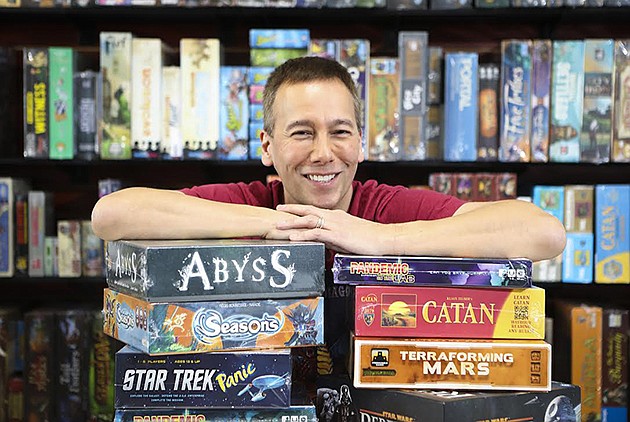- December 20, 2024
-
-
Loading

Loading

Executive: Peter Kageyama, a St. Petersburg-based author, speaker and international consultant on placemaking. Kageyama is the author of two books: “For the Love of Cities: The Love Affair Between People and Their Places” and “Love Where You Live: Creating Emotionally Engaging Places.” He speaks on community development around the country and is working with St. Petersburg Mayor Rick Kriseman on a video series called “St. Pete in Progress.”
Diversion: Board games. Kageyama is a self-proclaimed “board-game nerd.” But not what most people think of, such as Monopoly and Clue. He enjoys games that are more challenging and strategic — more modern games like Lord of the Rings and Marvel Super Hero games. “Board games are thematic, fun and great mental puzzles,” he says. Kageyama's favorite game right now is Terraforming Mars, a strategic game where players work to turn Mars from a lifeless planet to a place where colonization could happen.
Gateway drug: Kageyama's love for games dates back to when he was a teenager. He loved Dungeons and Dragons. That was a “gateway drug that got us in to this kind of play,” he jokes. Later, he started enjoying games created by American board-game company Avalon Hill, which are oftentimes military simulations or war games.
After college, Kageyama stopped playing as many games. About five years ago, his partner, Michelle Royal, got him the tile game Carcassonne as a holiday gift, and his addiction came back. “The hobby progressed from there,” Kageyama says. “A few games became over 500.”
Balance and challenge: Though most executives turn to a hobby to relax the mind, Kageyama enjoys engaging it. “It turns on a different part of my brain,” he says. He also enjoys getting away from technology and being more social. “We have tons of screen time, and we're looking for something that brings us back in balance,” he says.
The drama: Kageyama also enjoys “the drama” of board games. When you play a game like Pandemic, you cheer when you win, and when you take a hit, you groan, he says. But the main reason he enjoys playing board games is because they are more social than video games. “I've met some really great people because of board gaming.”
Though most people think of games as competitive, some are cooperative “where it is you and me against the game,” Kageyama says. An example is Pandemic, where a global contagion is impacting the world, and the players are researchers and medics, working to combat the spread.
Meetups: When Kageyama is home, he plays games a couple nights a week. He belongs to a local Meetup group, The Grand Gamers of St. Petersburg. A lot of gaming culture is centered on local game stores, according to Kageyama. His favorite is Critical Hit Games in St. Petersburg, where there are games for sale, but they also invite people in to play. “They are nurturing the culture,” he says.
Conventions: With the growing love for games, Kageyama attended the Dice Tower Gaming Convention in 2013, an Orlando show “with four days of non-stop board gaming,” he says. At the conventions, you have breakfast and then from noon to 2 a.m. you play games, according to Kageyama. He's also attended Gen Con in Indianapolis the past four years, which is the main gaming convention in the U.S. with more than 60,000 attendees. He recently attended the Board Game Geek convention in Dallas.
Signature events: Though he hasn't found work through his hobby, Kageyama has used examples from the game world to explain some of his ideas. For example, when he talks to cities about finding a signature event, he often brings up Gen Con, which used to be hosted in Lake Geneva, Wis. It's now the second-largest convention that Indianapolis hosts. It's similar to Comic-Con in San Diego, which attracts 160,000 people and is the largest convention in the city.
“When looking for a signature event, look what's already going on,” Kageyama advises. “Cities want the next South by Southwest. But with a little love and a little support,” a small event for a niche group can grow “and find that authenticity,” he says.